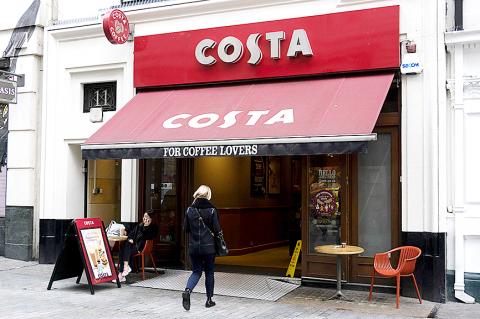Coca-Cola Co has agreed to buy the world’s second-largest coffee chain, Costa Coffee, from Britain’s Whitbread PLC for an enterprise value of £3.9 billion (US$5.1 billion), opening a new front in its push away from traditional sodas.
Whitbread yesterday said in a statement that the deal, which is to give Coke almost 4,000 coffee outlets in the UK and across Europe, has been agreed unanimously by the Whitbread board as in the best interests of shareholders.
Whitbread, which had been in the process of demerging its coffee business from its hotel chain, acquired Costa in 1995 for £19 million when it had only 39 shops.

Photo: AFP
For Coca-Cola, the deal adds to its efforts to move away from fizzy drinks toward healthier options for increasingly health-conscious consumers.
“Hot beverages is one of the few segments of the total beverage landscape where Coca-Cola does not have a global brand,” Coca-Cola chief executive officer James Quincey said. “Costa gives us access to this market with a strong coffee platform.”
Makers of soft drinks are branching out as consumers seek alternatives to sugary sodas. Earlier this month, PepsiCo Inc agreed to pay US$3.2 billion for SodaStream Ltd, which makes carbonated-water dispensers.
Costa outranks Starbucks Corp in the UK and is expanding in markets such as China. The company was one of the few big coffee chains up for sale after Nestle SA and the Reimann family’s investment company JAB Holding Co both went on an acquisition spree in the segment.
Coca-Cola sells coffee under the Georgia brand in Japan and has some other local products for specific markets.
Whitbread said it would reduce debt and contribute to the pension fund with the proceeds from the deal, and further expand its hotel chain Premier Inn in the UK and Germany.
“The announcement today represents a substantial premium to the value that would have been created through the demerger of the business and we expect to return a significant majority of net proceeds to shareholders,” Whitbread chief executive officer Alison Brittain said.
Additional reporting by Bloomberg

TECH CLUSTER: The US company’s new office is in the Shalun Smart Green Energy Science City, a new AI industry base and cybersecurity hub in southern Taiwan US chip designer Advanced Micro Devices Inc (AMD) yesterday launched an office in Tainan’s Gueiren District (歸仁), marking a significant milestone in the development of southern Taiwan’s artificial intelligence (AI) industry, the Tainan City Government said in a statement. AMD Taiwan general manager Vincent Chern (陳民皓) presided over the opening ceremony for the company’s new office at the Shalun Smart Green Energy Science City (沙崙智慧綠能科學城), a new AI industry base and cybersecurity hub in southern Taiwan. Facilities in the new office include an information processing center, and a research and development (R&D) center, the Tainan Economic Development Bureau said. The Ministry

ADVERSARIES: The new list includes 11 entities in China and one in Taiwan, which is a local branch of Chinese cloud computing firm Inspur Group The US added dozens of entities to a trade blacklist on Tuesday, the US Department of Commerce said, in part to disrupt Beijing’s artificial intelligence (AI) and advanced computing capabilities. The action affects 80 entities from countries including China, the United Arab Emirates and Iran, with the commerce department citing their “activities contrary to US national security and foreign policy.” Those added to the “entity list” are restricted from obtaining US items and technologies without government authorization. “We will not allow adversaries to exploit American technology to bolster their own militaries and threaten American lives,” US Secretary of Commerce Howard Lutnick said. The entities

Minister of Finance Chuang Tsui-yun (莊翠雲) yesterday told lawmakers that she “would not speculate,” but a “response plan” has been prepared in case Taiwan is targeted by US President Donald Trump’s reciprocal tariffs, which are to be announced on Wednesday next week. The Trump administration, including US Secretary of the Treasury Scott Bessent, has said that much of the proposed reciprocal tariffs would focus on the 15 countries that have the highest trade surpluses with the US. Bessent has referred to those countries as the “dirty 15,” but has not named them. Last year, Taiwan’s US$73.9 billion trade surplus with the US

The Taipei International Cycle Show (Taipei Cycle) yesterday opened at the Taipei Nangang Exhibition Center, with the event’s organizer expecting a steady recovery in the industry this year following a tough last year. This year, 980 companies from 35 countries are participating in the annual bicycle trade show, showcasing technological breakthroughs and market development trends of the bicycle industry at 3,600 booths, the Taiwan External Trade Development Council (TAITRA, 外貿協會) said in a statement. Under the theme “Ride the Revolution,” the exhibition has attracted more than 3,500 international buyers from 80 countries to preregister for the four-day event, which is expected to